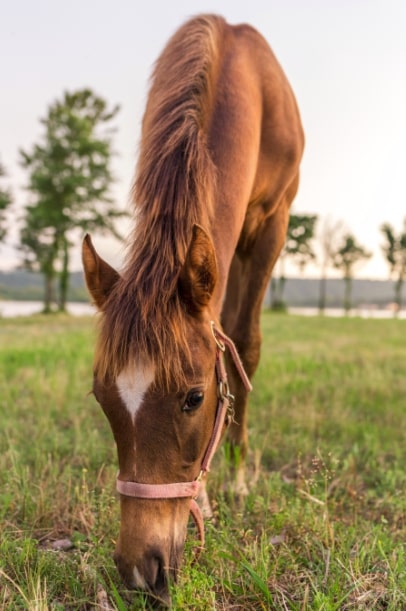When spring arrives, the days get longer. At the same time, everything gets warmer and our grass flourishes. Horse owners all over the country look forward to turning their animals out. They will embrace the change from mucking out. However, spring grass can cause problems for horses vulnerable to weight gain or laminitis. You need to consider this and ensure you take care with horse feed.
Ponies are famous for chomping down grass. They can consume as much as 5% of their bodyweight daily whilst living out 24/7. This equals around 12.5kg for a 250kg pony. Even though intake in horses might be lower, some could well give ponies a decent run for their money.
Spring grass can hold 11MJ DE/kg (megajoules of digestible energy per kilo: energy = calories) with ease. So, a 250kg pony living out at grass can devour sufficient energy to fuel a 500kg racehorse. This is equal to more than half a bag of conditioning cubes each day. As a result, it is easy to see how some ponies and horses gain weight with such ease.
In a study, ponies that had free access to grazing for six weeks were able to gain 16% of their bodyweight. This is equal to an 11st person putting on nearly 2st in six weeks.
Grass and simple sugars
Grass can hold up to 15% of simple sugars, most of which is sucrose. This is the primary form of sugar in molasses and the same kind that goes in our tea. As such, a 250kg pony living outside 24/7 might eat nearly 2kg of simple sugars every day only from grass. This is excessive, and something you need to factor in when thinking about horse feed.
However, this sugar isn’t the only danger. It’s possible for grass to be high in fructan too, or ‘stored sugar’. In truth, the total water soluble carbohydrate (WSC) level can be as high as 35%. This can include fructan and simple sugars.
Think to when you learned about science in school. Grass isn’t able to photosynthesise and generate sugar without sunlight. When the sun goes in your grass, it stops creating sugar. Although, provided everything is warm enough, like above 5ºC, stored sugars will fuel growth overnight. Conditions that heighten production but restrict growth lead to WSC’s gathering. Said conditions can include sunny frosty mornings. On the other hand, conditions that limit or halt photosynthesis but encourage growth aid with lowering WSC levels in the grass.
Fertilising paddocks
Numerous owners have concerns that fertilising their paddocks will lead to the grass’ sugar content surging. Since it is utilised for growth though, this might not happen. Grass will carry on generating it whenever the sun is out. If nutrient deficiencies existing in the soil restrict growth, sugar levels can stay high. But, decent pasture management can help limit the gathering of WSC in the grass. As for laminitics and good doers, they will likely still need their access to grazing limited.
Minimising intake
There are steps you can take to minimise grass intake. It is a good idea to consider some or all of them if you want to keep a handle on weight gain.
One thing you can do is strip grazing. Ponies that graze like this have been witnessed gaining far less weight compared to ones given free access to a limited amount of grazing. If available, think about using non-grass turnout or bald paddocks. At the same time, offer a suitable hay or replacer.
You can also try using a grazing muzzle. They can restrict grass intake by around 80%. This is with ponies that were turned out for three hours. One thing you’ll want to avoid is turning your pony or horse after removing their muzzle. Some animals can gain weight due to eating more after their muzzles are gone.
Stay aware of binge eating too. Ponies lacking muzzles that have been turned out for three hours have been seen consuming nearly 1% of their body weight in grass. This can equal two-thirds of the total daily forage allowance for those animals on weight loss diets.
Start shopping with us for horse feed
At JS Hubbuck Ltd we supply excellent products that are reasonably priced. This is true whether you need feed for animals, clothing, or fertiliser. Whatever it is you’re after, we will make sure you can order it.
So, please get in touch if there is anything you’d like to discuss with us. It could be about horse feed, animal health, and more. We have a lot of knowledge to share that can be very useful.

